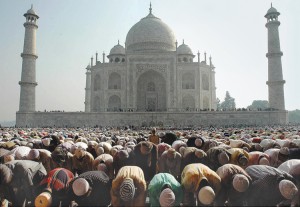The New Moon of Ramadan
June 7, 2016

Muslims pray at the Taj Mahal in Agra, India, during the holy month of Ramadan.
Credit: © AFP/Getty Images
On Sunday night, June 5, at the sighting of the new, crescent moon, the Muslim holy month of Ramadan began in many parts of the world. Ramadan is a month of fasting when Muslims who are physically able to do so avoid eating or drinking during daylight hours. Such fasting is thought to purify the faithful physically and spiritually. It also helps bring to mind the poor, and many Muslims give to charities or perform charitable acts during Ramadan. According to Islam, Ramadan is the month when the prophet Muhammad received the first of the revelations that comprise the Qur’ān, the holy book of Islam. Fasting during Ramadan is one of the Five Pillars of Islam, formal acts of worship that provide a framework for Muslim life.
In addition to avoiding food and drink, observant Muslims abstain from smoking and sexual activity from sunrise to sunset. At night, they may eat, drink, and resume other normal activities. They break the daily fast with a meal known as iftar. Later, an extremely early predawn meal prepares Muslims for the day ahead. In some Middle Eastern countries, the government enforces fasting, and people who eat during the day may be fined or even arrested. In addition to being a time for fasting, Ramadan is a period for special prayer and religious contemplation. Nightly prayer at a mosque and recitation from the Qur’ān are common Ramadan practices.
Ramadan is the ninth month of the Islamic year, which is based on lunar months rather than solar months. For this reason, Ramadan moves backward by about 10 days each year, migrating through the seasons. In many parts of the world, different seasons have longer or shorter days, meaning longer or shorter periods of fasting. In some far northern locations, such as northernmost Sweden, the sun does not set for months at a time during summer. Muslims there observe Ramadan based on the day’s length elsewhere, such as Mecca, Saudi Arabia, the holiest city of Islam.
A major Islamic festival called Id al-Fitr (Feast of Fast-Breaking) marks the end of Ramadan. Muslims celebrate Id al-Fitr during the first three days of Shawwal, the 10th month of the Islamic lunar calendar. On the first morning of the festival, they attend special prayer services. Throughout the festival, they visit and share meals with family, friends, and neighbors, and children receive gifts.


